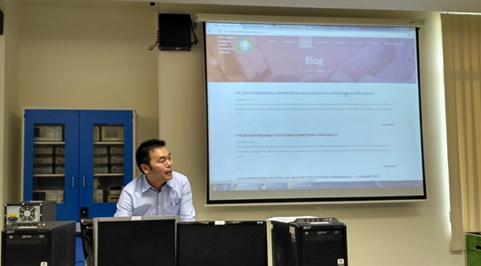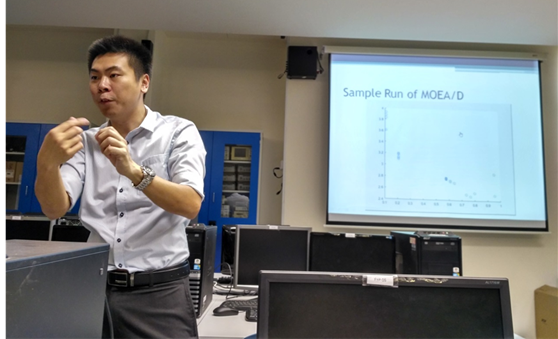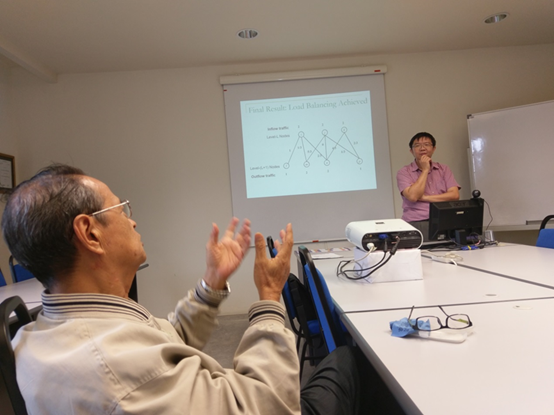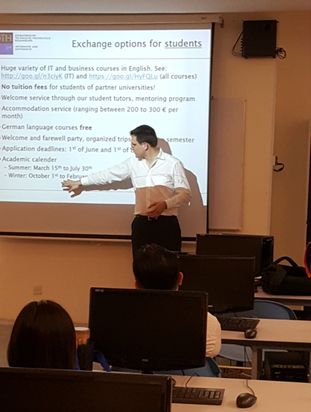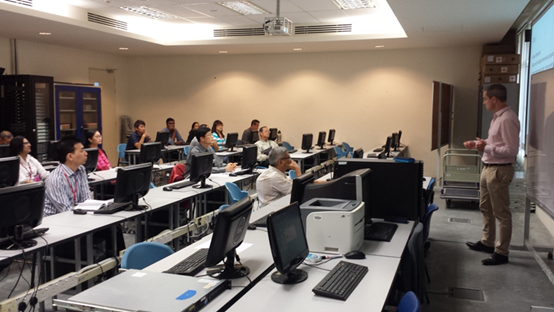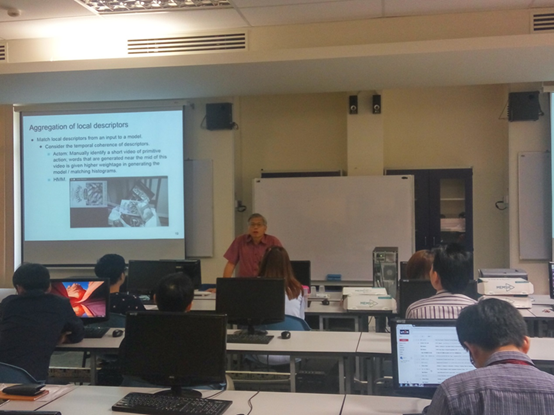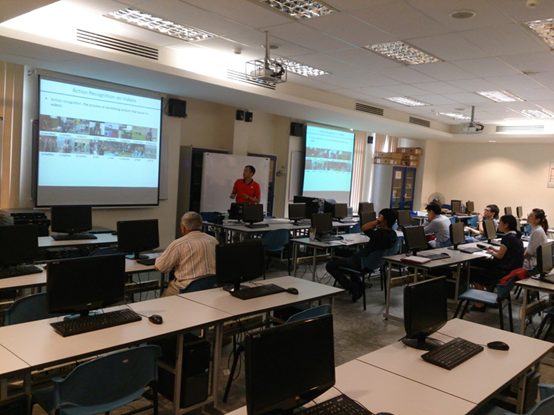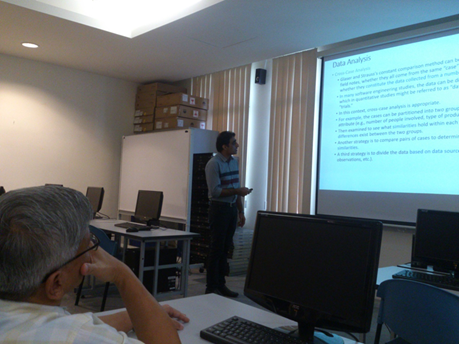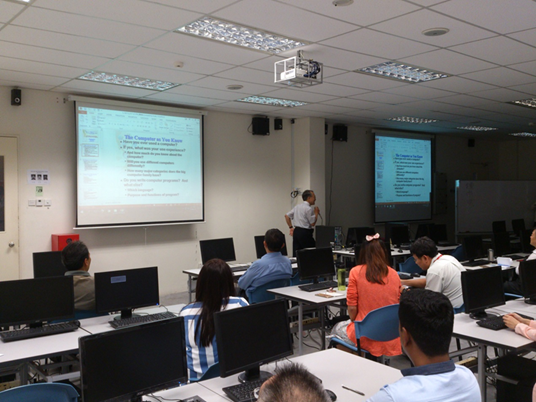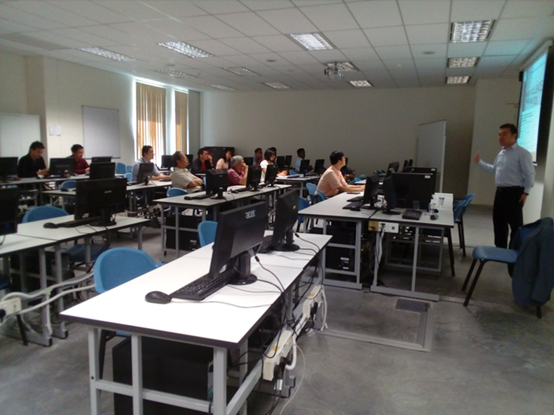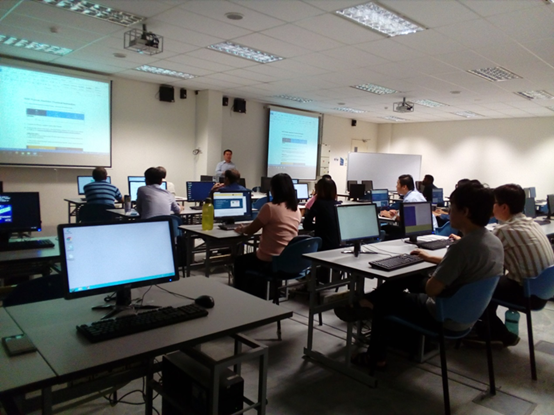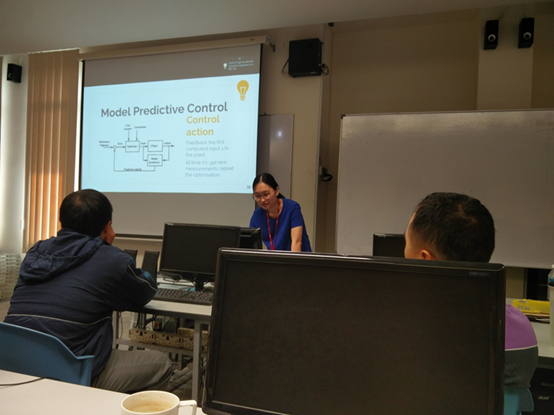Activities Report
Business Intelligence and Analytics: Research, Education and |
|---|
Date: 23 January, 2017 In a recent worldwide survey of ICT spending conducted by Gartner, Business Intelligence and Analytics technologies (still) ranked among top technology priorities for many chief information officers (CIOs). During the talk, Dr William Yeoh shared his personal insights on the evolution of BIA studies, the development of BIA education/training programs in Australia, and shed light on possible new avenues for future research. After the talk, Dr William also conducted a practical workshop on IBM Watson Analytics.
|
Tower of Hanoi, for Various Teaching Targets in Computer Science |
|---|
Date: 8 February, 2017
|
| From Multi-objective to Many-objective optimization: The emerging research issue in Evolutionary Computation |
|---|
Date: 17 March, 2017
|
| Maximum Flow Problem and its Applications in Networking |
|---|
Date: 21 April, 2017 Given a directed graph with each edge having a capacity, the maximum flow problem (MFP) is to find a feasible flow (i.e., each edge receives a flow without exceeding its capacity) from a single source, s to a single sink, t in such a way that the total amount of the flow from the source (to the sink) is maximized. In this talk, the speaker reviewed the MFP and the algorithms to solve the problem. Moreover, two applications of MFP in networking have been discussed, namely Maximum Bipartite Matching and Network Load Balancing |
| OTH Regensburg: Exchange Opportunities and Research Overview in the field of IT-Management in Particular and Computer Science in General |
|---|
Date: 5 May, 2017
Prof. Dr. Markus Westner is a professor in the Faculty of Computer Science and Mathematics at OTH Regensburg, a Technical University of Applied Science. As an academic and educator, he specializes in IT-Performance-management and Management Consulting. His main research interests are in IT-Strategy and IT-Sourcing.
|
| Security Challenges in IoT |
|---|
Date: 15 May, 2017 Internet of Things (IoT) is becoming a central theme in current technology trend whereby objects, people or even animals and plants can exchange information over the Internet. IoT can be referred to as a network of interconnected devices such as wearables, sensors and implantable, that has the ability to sense, interact and make collective decisions autonomously. In short, IoT enables a full spectrum of machine-to-machine communications equipped with distributed data collection capabilities and connected through the cloud to facilitate centralized data analysis. Despite its great potential, the reliability of IoT devices is impeded with its security challenges. The IoT security concerns ranges from the application layer up to the physical layer. In this forum, Dr. Vasaki outlined some of this security challenges in IoT, future research trends towards IoT security and some of the best practices in IoT security. |
| The FICT Postgraduate Colloquium (May 2017) |
|---|
Date: 18 May, 2017
CISST and FICT have organized the first FICT Colloquium of the year on 18th May, 2017. In this colloquium, all postgraduate students (both Master and PhD students) presented their recent work or findings in their field of research.
|
| R&D Experience Sharing Session |
|---|
Date: 25 May, 2017 Prof Paul Roe is a professor in the Science and Engineering Faculty at Queensland University of Technology in Brisbane Australia. At QUT, he founded and led the Microsoft-UT eResearch Centre, which investigated smart tools for eResearch.
|
| The Death of Data Warehousing |
|---|
Date: 22 June, 2017 |
| Human Activity Recognition |
|---|
Date: 27 July, 2017 Analysing and understanding of human action through visual data require advances in complementary research areas such as object recognition, human dynamics, domain adaptation and semantic segmentation. In this forum, the result of a recent survey paper on human action recognition was discussed. Several approaches for action recognition was reviewed, including the handcrafted representations and deep architecture. |
| Multi-Stream Convolutional Network for Action Recognition in Videos |
|---|
Date: 29 August, 2017 In recent years, multi-stream convolutional networks (CNN) has been shown to deliver state-of-the-art performance for action recognition tasks in videos. The two-stream CNN architecture was first proposed by Simonyan in 2014 and since then many different variants have appeared. In this forum, Dr. Tan first provided a historical background of action classification by presenting a traditional action classification system using hand-crafted features. This is followed by a discussion of the general CNN architecture. Next, the original two-stream convolutional network proposed by Simonyan was presented. Lastly, more recent works on multi-stream convolutional networks was discussed. |
| Generative Adversarial Networks (GANs) – An Introduction |
|---|
Date: 28 September, 2017 |
| Qualitative Research in Information Systems / IT |
|---|
Date: 31 October, 2017 |
| How should We Use Computers Right, and Design Good Computers? |
|---|
Date: 14 November, 2017
|
| GPU based Sparse LU Solver for Circuit Simulation |
|---|
Date: 24 November, 2017
LU factorization is widely used in many scientific computation, including circuit simulation to solve a set of linear equations efficiently. It is one of the most critical bottleneck in Simulation Program with Integrated Circuit Emphasis (SPICE)-based circuit simulators when the involved circuit matrices are large. To improve the simulation speed, GPU was proposed to accelerate the LU factorization process. In this talk, some common techniques for implementing a GPU based LU solver, together with some potential research directions, were introduced. |
| Learning Analytics for Enhanced Students Performance |
|---|
Date: 5 December, 2017 In this talk, Dr Yeoh presented a case study based on a recently conducted learning analytics research. Using a large data set acquired from a postgraduate finance course offered at an Australian university, the research explores the students’ online quiz completion patterns and the impact of instructional time constraint on online mastery learning. Specifically, utilising Self-Organising Maps (a neural network-based cluster analysis technique), the study explores and visualises students’ online quiz completion patterns and its association with their final examination performance. |
| Practical Workshop: Watson Analytics |
|---|
Date: 5 December, 2017 This Analytics Educational Workshop aims to introduce the contemporary analytics curriculum development, certification programs, available teaching and learning resources, practical assessment, as well as the technical support provided by IBM for university/ academics. The workshop facilitator also shared their ‘best-practice’ teaching experiences and go through sample assignments that apply IBM Watson Analytics suite. The workshop participants have gained hands-on practical session using IBM Watson Analytics, Social Media Analytics, and Predictive Analytics. The workshop has allowed the participants to adapt the Watson analytics suite and associated it with their analytics curriculum or data science program. |
| The FICT Postgraduate Colloquium (December 2017) |
|---|
Date: 14 December, 2017 CISST and FICT has successfully organized the second FICT Colloquium of the year on 14th December 2017. |
| From PID to Model Predictive Control (MPC) |
|---|
Date: 21 December, 2017 For over eight decades, Proportional-Integral-Derivative (PID) controller has been the first choice of controller for most applications. Model predictive control (MPC) is the only advanced control scheme that has had a notable impact on the industry, and is currently considered as a sensible alternative to PID. The main pillars of MPC’s remarkable success were mainly due to its ability to handle complex systems with hard control constraints and multiple inputs, and optimize performance using repetitive online optimization. In this talk, the concept of MPC was explained after a brief introduction to control system. |

